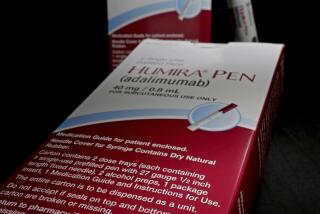Generic-Drug Firm Watson Plans to Buy Rival Andrx
- Share via
Making a bid to stay near the top in the eat-or-be-eaten generic-drug business, Corona-based Watson Pharmaceuticals Inc. said Monday that it would buy a smaller rival for $1.9 billion in cash.
Under the deal, Watson would pay $25 a share for Davie, Fla.-based Andrx Corp. The purchase, which must be approved by Andrx shareholders and federal regulators, is expected to be final in six months.
Watson Chief Executive Allen Chao touted the acquisition as an opportunity to increase the number of drugs it has under development, add a healthy drug-distribution business and boost profit beginning next year.
“This deal will make Watson a much stronger company and position us for growth,” with a combined 60 drugs in the pipeline, Chao said.
Shares of Andrx soared $2.14, or nearly 10%, to $23.73. But Watson shares fell 55 cents to $29, a 52-week low. Some analysts questioned whether the deal would be enough to ensure Watson’s future.
“Buying Andrx allows Watson to survive, but not to grow” in a highly competitive and consolidating industry, W.R. Hambrecht & Co. analyst Andrew S. Forman said. “The market realizes that.”
If the deal closes, Watson would become the third-biggest supplier of generic drugs in the U.S. behind Israel-based Teva Pharmaceutical Industries Ltd. and Canonsburg, Pa.-based Mylan Laboratories Inc., the company said.
Teva has spurred consolidation in the field by buying Miami-based Ivax Corp. in January.
One major problem for Watson is that its core generic-drugs business has not been growing, Forman said.
Even with Monday’s acquisition, “At the end of the day, [Watson is] going to have to have a competitive advantage” to survive, he said.
Watson was founded in 1984 by a pair of scientists: Chao and David Hsia, the company’s senior vice president for scientific affairs. The company, with more than 3,800 workers, makes more than 130 generic pharmaceuticals -- including birth control drugs and generic versions of Valium and Percocet.
Watson earned $138 million last year on $1.6 billion in sales. Although its quarterly revenue more than tripled since 1998, its earnings per share have been relatively flat.
In addition, Watson’s stock has been up less than 3% since the end of 2002, and has lagged behind other major generic-drug companies. Barr Pharmaceuticals Inc., for example, has been up 123% in the same period.
Andrx, founded in 1992, specializes in timed-release generic versions of popular drugs such as Claritin-D 24 and the antidepressant Paxil. The company, with 1,700 employees, earned $66 million last year on revenue of $1.1 billion.
But Andrx has struggled in the last year. The Food and Drug Administration put the company’s drug applications on hold after finding manufacturing problems at its plant in Davie. Andrx expects to hear the results of a follow-up inspection in several weeks.
Watson officials said the Andrx deal would add to profit in 2007 and increase the combined company’s revenue to about $2.8 billion that year, although they offered no forecast for 2006.
Even with this added growth, in a few years “my guess is that someone else is going to be buying Watson and it isn’t going to be an American company,” Forman said. He named Cipla Ltd., India’s second-largest generic-drug maker, as a possible suitor. Since 2002, Watson and Cipla have had a deal under which the Corona company markets drugs made by Cipla.
Other analysts praised the Watson-Andrx deal.
David Woodburn of Prudential Equity Group, in a note to investors, expressed some concern about the pending FDA inspection of Andrx’s plant.
Overall, however, “we think Andrx makes an interesting target,” he wrote.
Times staff writer Tom Petruno contributed to this report.
More to Read
Inside the business of entertainment
The Wide Shot brings you news, analysis and insights on everything from streaming wars to production — and what it all means for the future.
You may occasionally receive promotional content from the Los Angeles Times.









